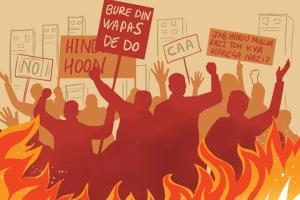Outside the IIM Bangalore gates, students lined up their shoes and placards, in a stunning image of protest, when Section 144 restricted them. Protesters bussed away by cops tweeted to calm each other

Illustration/Uday Mohite
![]() It has been a week of love and passion, as protests have swelled across the country.
It has been a week of love and passion, as protests have swelled across the country.
ADVERTISEMENT
Young women from Jamia Millia, Ladeeda Farzana and Ayesha Rena, held up a forbidding finger to the police, as they shielded their friend—bravery and love. In their interviews political clarity, religious faith, family support intertwined fluidly. Outside the IIM Bangalore gates, students lined up their shoes and placards, in a stunning image of protest, when Section 144 restricted them. Protesters bussed away by cops tweeted to calm each other.
We saw great diversity. Different ages, classes, castes, regions, religions, political engagements marched together. Irrepressible slogans electrified our social media feeds, Faiz holding hands with Harry Potter, humour with sincerity—"Bure din wapas de do", "Jab Hindu Muslim razi toh kya karega Nazi", "Hindu hoon, c*** nahin", "We skipped our
lessons to teach the government one".
People distributed food and water. Someone shared how she tried to pay a snack seller, saying "I want to contribute." "So do I," he replied. My favourite story was of a Muslim lady distributing til shakri, who, when asked "Auntie what will you say when they demand documents?" replied, "I'll say I am the document." Indeed human beings, with our complex differences and cross-cutting commonality, are the documents systems should be designed around. That is what is meant by a politics of love.
What is the opposite of love? It is not hate. The opposite of love is fear.
The fear of others, fear of being wrong, of being vulnerable, makes you believe those who say that everyone hates you, except me, so listen to what I say, whether it is petty taunts in speeches or lies on WhatsApp. But, this false flattery is not love. It is a relationship of violence and control when CMs talk of revenge, not justice, when all dissent is labelled disobedience and whole states are imprisoned and brutalised. It is a relationship where citizens are infantilised. Those who obey, like lonely children, get to have the government as their imaginary friend.
It is fear too, that underlies 'benevolent critique' of the protests. "You are just playing into the majority's hands." "Muslims should not foreground their faith so much, it confirms the prejudice in remarks like the PMs, that you can tell protesters by their clothes." It's the kind of fear of those who match with someone awesome on Tinder, or even IRL, and can't manifest it into a date or relationship. Those who fear hope, believe only worst fears can come true, endorse the status quo while trying to distance themselves from it.
It's understandable. Love is a hard path because it is an open road. We walk down it mostly with principled belief, that it is possible to accommodate two or more truths/selves, without one oppressing the other. Love is open to the possibility of change, especially in our
own selves.
We don't know what the outcome of the protests will be. They have shown people they are not alone in their thinking and given many their first offline political engagement. Will this help reinvigorate the meaning of citizenship? Will people be able to extend meaningful solidarities to Kashmir and Assam? We will have to hope and persist. Creativity, intelligence and love unleashed are powerful things too, differently than money or guns, because, in the end the human being is the document.
Paromita Vohra is an award-winning Mumbai-based filmmaker, writer and curator working with fiction and non-fiction. Reach her at paromita.vohra @mid-day.com
Catch up on all the latest Crime, National, International and Hatke news here. Also download the new mid-day Android and iOS apps to get latest updates
 Subscribe today by clicking the link and stay updated with the latest news!" Click here!
Subscribe today by clicking the link and stay updated with the latest news!" Click here!






